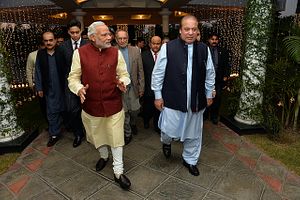In early hours of January 2, terrorists attacked the Indian Air Force base in Pathankot, killing seven Indian soldiers. Timely retaliation by Indian forces resulted in all six terrorists killed, preventing the greater devastation that could have occurred if the terrorists had been able to reach the high-value strategic assets they were targeting.
Media reports in the wake of the attack suggested that the terrorists received clandestine support from Pakistan. India Today has claimed that “the brazen attack was carried out on the behest of Pakistani’s intelligence agency Inter-Services Intelligence (ISI).” Other reports have suspected the involvement of Pakistan-based Jaish-e-Muhammad. The Hindustan Times and other Indian newspapers have reported that phone calls made by the terrorists were intercepted, and were made to Bahawalpur in Pakistan, the hometown of Jaish chief Maulana Nasood Azhar.
Experts in India feel that the heavily armed terrorists would not have been able to carry out the attack without the full knowledge and support of the Pakistani military and the ISI. G. Parthsarathy, former Indian high commissioner to Pakistan, said on an NDTV program that it would be naïve to believe the argument that the attackers were rogue elements or non-state actors.
In fact, while welcoming Prime Minister Narendra Modi’s surprise visit to Lahore, many security experts and former diplomats had cautioned India to be ready to deal with an adverse situation like the Kargil War, which took place following the Lahore Summit of 1999. At the same time, there was apprehension among the Indian strategic community that the Pakistani Army would not have taken kindly to Modi’s oblique reference to Pakistani as a sponsor of terrorism in Afghanistan in his address to the Afghan parliament on December 25. The fears may well have been justified, given Pathankot and the subsequent attack on the Indian consulate in the city of Mazar-i-Sharif. At any rate, the incidents refute any belief that the Pakistani military is supporting Prime Minister Nawaz Sarif in his endeavor to improve ties with India.
Only an investigation by the National Investigating Agency will enable India to conclusively establish the identity of the terrorists and ascertain the role of the Pakistani military and ISI. But what is clear from the Pathankot attack is the fact that the terrorists had two main aims. The first was to destroy MiG-21, Mi-25, Mi-35, and other military hardware, while the second was to derail the peace process, which received a boost with Modi’s surprise stopover in Lahore.
While the Indian forces neutralized the terrorists before they could reach their target area, the Indian government has taken care in dealing with the attack, trying to ensure that it does not cast a cloud over the peace process, especially given that a meeting of foreign secretaries is scheduled in mid-January. This is evident from the fact that New Delhi has been cautious about naming Pakistan with regard to this terrorist attack. Commenting on the attack, Modi said, “Today, enemies of humanity who can’t see India progress tried to strike at our strategic area, a prominent airbase at the Pathankot.”
Meanwhile, in an unprecedented move, the Pakistani government has condemned the attack, and offered its cooperation to India. In a brief press statement, Pakistan’s Foreign Office said India and Pakistan will continue with a “sustained dialogue process.” A spokesperson went on to say that, “In line with Pakistan’s commitment to effectively counter and eradicate terrorism, the government is in touch with the Indian government and in working on the leaders provided by it.” Yesterday, NDTV reported that Pakistani authorities have carried out raids in relation to the attack, leading to some arrests, and has formed a joint investigation team. These are welcome steps.
Understandably, the Pathankot airbase attack has put the Indian government in a difficult situation, especially at a time when Modi is ready to travel miles to forge a durable peace with Pakistan. In fact, the attack has given opponents the opportunity to criticize Modi’s overtures towards Pakistan. However, it is equally true that New Delhi has very limited options as far its relations with Islamabad are concerned. It is only through talks that India and Pakistan will be able to move towards building a peaceful environment in South Asia. The renewed dialogue process provides India with an opportunity to place all the evidence relating to the Pathankot attack before Pakistan and ask it to show its commitment to fighting terrorism.
Meanwhile, India can call on the United States to take serious note of the growing terrorist activity in South Asia and to pressure Islamabad to step up its efforts to eliminate the threat. India should also seek help from Russia and Japan in building pressure on Pakistan.
What makes the current phase in India-Pakistan relations different is the fact that both sides have refrained from attacking and counter-attacking each other, preventing the relationship from dropping to its nadir, as has happened after past terrorist attacks on India. There is reason to hope then that the two countries can work around the vested interests that do not want to see them live together in peace and prosperity.
Sumit Kumar is an ICSSR Doctoral Fellow at the UGC Centre for Southern Asia Studies, Pondicherry University.

































